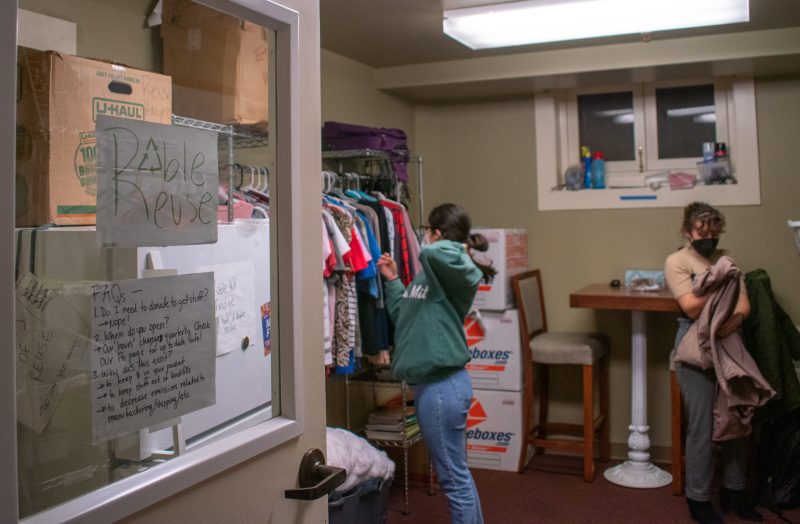Down beneath the Earth, just through the basement door of Roble Hall’s B-wing, resides one of Stanford’s hidden gems: Roble Reuse.
At Stanford, many students navigate daily life with the help of various, seemingly insignificant items: bed sheets, highlighters and laundry baskets. But for students without those things, college life can be infinitely more daunting.
Roble Reuse is a student-led initiative started in fall 2018 with the hopes of promoting environmental sustainability as a part of the 2016 initiative Roble Living Laboratory for Sustainable Living (ROLLSS). What is essentially a free thrift shop on campus, Roble Reuse works to ensure that all Stanford students have access to college necessities like clothes or even luggage. After being temporarily closed, the store reopened on Feb. 8.
“The Roble Reuse is an effort to give the Stanford community a consistent place and time to donate or grab free shoes, clothing items, and dorm essentials,” according to the effort’s website.
Roble Reuse founder Crystal Perez ʼ22 understands the importance of having the “small things” like umbrellas, jackets and socks, as many First Generation and Low Income (FLI) students are left especially vulnerable to feelings of disillusionment and isolation if they’re missing items necessary for college life. As a FLI student herself, Perez added that it’s the absence of these basic items that has the potential to instill a sense of non-belonging.
“Coming to Stanford was very new and very exciting in many ways, but at the same time I don’t think that I really thought about all the things that I needed to be successful in college. It’s like really small things that I would be missing like umbrellas, good winter coats,” said Perez. “Small things like that signal to people that you don’t know the language here, you don’t know the background, the context, that you’re not part of the community, you don’t belong here.”
Perez recalls reading a particular anecdote from Michelle Obama’s memoir, “Becoming,” during her frosh year, in which Obama brought the wrong size bed sheets with her to Princeton. Drawing parallels between her own college experience and the former First Lady’s, Perez was inspired to take action during her first year at Stanford.
After researching other Stanford sustainability programs to support students in need of living necessities and noting the recent closure of The Free Store prior to her matriculation, Perez collaborated with her Resident Fellows, Jeff Ball and Becky Bull, and pitched the idea of Roble Reuse. What was once a muted-green study room in Roble Hall was transformed into the headquarters of the new initiative. According to Perez, since Roble Reuse’s conception, the center has amassed hundreds of pounds of donated materials, with clothes being of greatest abundance.
Alana Hernandez ʼ23 has been part of the Roble Reuse staff since her freshman year. Not only does Hernandez appreciate Roble Reuse’s intended mission of aiding FLI students, but she also thinks the center has transformed into a safe and accepting community space for all students, explaining that the center is open for everyone and anyone.
“My favorite part about working there is that we get to help people find things that they need for free. Especially since we do mostly have clothes. I really like that we can at least offer the option, even if it’s not a whole wardrobe. Just providing a place for students to go where there isn’t a pressure to spend money is really important,” Hernandez said. “It’s also a sense of community building. It’s really helpful for FLI students, but it’s not only for FLI students. It’s a place of community, a safe space where students know they won’t be turned away.”
Those who have utilized Roble Reuse’s resources often come in looking for one thing, and instead end up leaving with an armful of clothing and a heart full of warmth. This was the case for Amari Pierce ’22.
Having made plans to visit the center with a friend, Pierce made her way to Roble Hall one Friday last quarter.
“I don’t remember what I went in there for, probably something practical. I didn’t end up finding it, but I ended up with some really nice clothes. It was great,” Pierce said.
While COVID-19 restrictions have strained Roble Reuse’s hours, limiting operation to individual student appointments during fall quarter, the center is once again open for the winter quarter.
The only remaining point of contention is the issue of visibility, voiced by the Roble Reuse staff. As Roble Reuse is an initiative dedicated to sustainability, flyering advertisements is not an option. Instead, the center relies mostly on word-of-mouth and email announcements. According to Hernandez, Roble Reuse is hoping to expand their outreach to as far as other schools on campus, including the graduate schools. In order to do so, the center is brainstorming new ways to get the word out about donations, hours and events.
“Roble Reuse is a beautiful creation and a good example of what sustainability can look like at Stanford,” Hernandez said.
The staff at Roble Reuse highly encourage lightly used donations of all kinds, ranging from clothing, bedsheets and room decor to luggage, school supplies and umbrellas. To donate, visit Roble Hall and contact the staff members through one of their forms of social media. Students can contact staff members on Facebook or Instagram at @robleruse or join the thrift store’s email list [email protected]. Roble Reuse is open to the public via Calendly appointment Tuesdays 9:30 a.m. to 11:30 a.m., Wednesdays 4 p.m. to 6 p.m. and Sundays 1 p.m. to 3 p.m.
